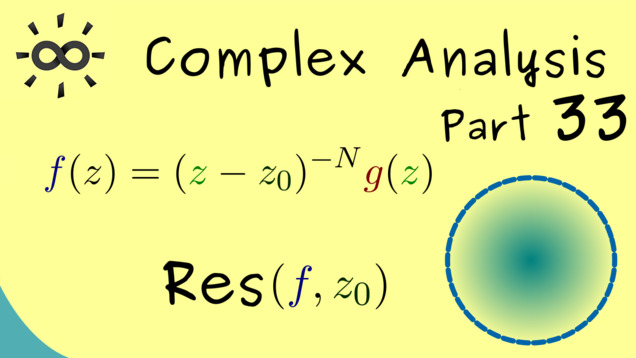
-
Title: Residue for Poles
-
Series: Complex Analysis
-
YouTube-Title: Complex Analysis 33 | Residue for Poles
-
Bright video: https://youtu.be/1kJJwFSgUng
-
Dark video: https://youtu.be/BqXZntDIVgY
-
Ad-free video: Watch Vimeo video
-
Quiz: Test your knowledge
-
Dark-PDF: Download PDF version of the dark video
-
Print-PDF: Download printable PDF version
-
Thumbnail (bright): Download PNG
-
Thumbnail (dark): Download PNG
-
Subtitle on GitHub: ca33_sub_eng.srt missing
-
Timestamps (n/a)
-
Subtitle in English (n/a)
-
Quiz Content
Q1: Let $f: D \rightarrow \mathbb{C}$ be a holomorphic function given by $f(z) = \frac{1}{z} + \frac{1}{z^2}$. Which claim is correct?
A1: $ f(z) = z^{-2} (1+ z) $
A2: $ f(z) = z^{-1} (1+ z) $
A3: $ f(z) = z^{-2} (1+ z^2) $
A4: $ f(z) = z^{2} (1+ z^{-1}) $
Q2: Let $f: D \rightarrow \mathbb{C}$ be a holomorphic function given by $f(z) = \frac{1}{z} + \frac{1}{z^2}$. What is the order of the pole $z_0 = 0$?
A1: $ 2 $
A2: $ 1 $
A3: $ -2 $
A4: $ 0 $
A5: $ -1 $
A6: One needs more information.
Q3: Let $f: D \rightarrow \mathbb{C}$ be a holomorphic function with a pole of order $1$ at $z_0$. What is the correct formula to calculate the residue?
A1: $$ \mathrm{Res}(f, z_0) = \lim_{z \rightarrow z_0} (z-z_0) f(z) $$
A2: $$ \mathrm{Res}(f, z_0) = \lim_{z \rightarrow z_0} \frac{d}{dz} (z-z_0) f(z) $$
A3: $$ \mathrm{Res}(f, z_0) = \frac{1}{2} \lim_{z \rightarrow z_0} (z-z_0) f(z) $$
A4: $$ \mathrm{Res}(f, z_0) = \frac{1}{3!} \lim_{z \rightarrow z_0} \frac{d}{dz} (z-z_0) f(z) $$
Q4: Let $f: D \rightarrow \mathbb{C}$ be a holomorphic function given by two holomorphic functions in the form $f(z) = \frac{h(z)}{g(z)}$ with a pole of oder 1 at $z_0$. This means that $g$ has a zero of order 1 at $z_0$. Which statement is correct?
A1: $$ \mathrm{Res}(f, z_0) = \lim_{z \rightarrow z_0} (z-z_0) \frac{h(z)}{g(z) - g(z_0)} = \frac{h(z_0)}{g^\prime(z_0)}$$
A2: $$ \mathrm{Res}(f, z_0) = 1$$
A3: $$ \mathrm{Res}(f, z_0) = \frac{h(z_0)}{g(z_0)} $$
A4: $$ \mathrm{Res}(f, z_0) = \frac{1}{3!} \lim_{z \rightarrow z_0} \frac{d}{dz} (z-z_0) f(z) = g^\prime(z_0) $$
-
Last update: 2024-10